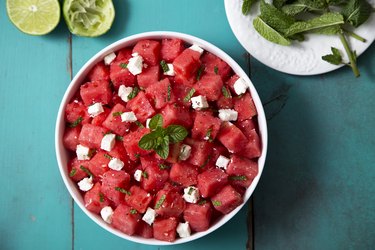
When you're dehydrated, you probably feel tired and drained — and for good reason: Your body is 60 percent water, a compound that's essential for survival. Some of the best foods for dehydration recovery include those with high water content, such as watermelon and cucumbers.
How Much Fluid to Consume
Video of the Day
Getting enough fluids in your diet is crucial for a healthy, active life. Harvard University's School of Public Health stresses that adequate water levels are necessary to regulate body temperature and keep your joints lubricated. It may also help prevent infections and keep your organs functioning properly. On top of that, being well-hydrated may improve sleep quality, cognition and mood.
Video of the Day
The Mayo Clinic advises that men consume about 15.5 cups (3.7 liters) of fluids per day while women should consume about 11.5 cups (2.7 liters) a day. Pregnant women should aim for about 10 cups (2.4 liters) of fluids a day, while those who breastfeed need approximately 13 cups (3.1 liters) daily.
Factors that can contribute to a dehydrated state include exercise, weather (particularly very hot and humid weather) and being at high altitudes. Fever, vomiting or diarrhea, pregnancy and breastfeeding may increase your risk of dehydration too.
It's also important to get enough electrolytes, minerals that have an electric charge. These nutrients, which accumulate in your blood, urine and tissues, help balance the amount of water in your body, among other functions, points out the U.S. National Library of Medicine.
Examples of electrolytes are sodium, calcium, potassium, chloride, phosphate and magnesium. They can be found in the foods you eat and the fluids you drink. Electrolyte levels in your body can become too low or too high when the amount of water in your system changes — like when you're dehydrated.
Foods to Eat When Dehydrated
The Cleveland Clinic offers a comprehensive list of some of the best foods for dehydration recovery. Include them in your diet to stay hydrated and boost your fluid intake. These foods also are ideal for athletes as they tend to lose water and electrolytes during training.
The following fruits and vegetables are over 90 percent water content and can make it easier to get more fluids in your diet:
- Watermelon flesh contains 91 percent water as well as lycopene, which can help protect your cells from sun damage.
- Strawberries are 91 percent water and boast large doses of flavonoids, a class of antioxidants that may improve cognitive function, among other benefits.
- Cucumbers are 95 percent water and contain anti-inflammatory compounds that help remove waste from the body and may reduce skin irritation. They may also help fight the effects of aging.
- Celery is 95 percent water by weight. Plus, it's low in calories and high in vitamin K, folate and potassium.
- Iceberg lettuce contains 95 percent water, while spinach is 91 percent water and chock-full of vitamins, such as A and K, as well as potassium and iron, according to the USDA's FoodData Central.
- Zucchini contains almost 95 percent water plus antioxidants like beta-carotene, lutein and zeaxanthin.
- Cauliflower is 92 percent water by weight and delivers high doses of vitamins C and K.
Other Ways to Rehydrate
Drinking water is an easy way to stay hydrated, but you may also reach for tea, fresh juices or coconut water. These beverages are hydrating too, but they may also provide extra calories and sugars.
Unsweetened coconut water is often lauded as an aid to rehydration. The Mayo Clinic defines coconut water as the clear fluid inside the coconut — a sort of coconut juice. It's rich in potassium, sodium, manganese and other electrolytes, keeping you hydrated throughout the day. Plus, it's over 95 percent water, as per the USDA.
Coconut water can be a good alternative to sports drinks. The latter do contain electrolytes, but they are also high in sugar. Keep in mind that commercial coconut water may contain sugar as well, and one brand may have more vitamins and minerals than another.
The results of a clinical trial published in the March 2016 issue of the American Journal of Clinical Nutrition showed that orange juice and skim milk also have rehydrating effects, although further research is needed to determine if they promote longer-term fluid retention and maintenance of fluid balance for prolonged periods.
- Cleveland Clinic: "Dehydrated? These 7 Foods Will Satisfy Your Thirst and Hunger"
- USDA FoodData Central: "Spinach, Raw"
- Mayo Clinic: "Water: How Much Should You Drink Every Day?"
- USDA FoodData Central: "Coconut Water, Ready-to-Drink, Unsweetened"
- Harvard School of Public Health: "The Importance of Hydration"
- Mayo Clinic: "What is Coconut Water and What's Behind the Hype?"
- U.S. Library of Medicine: "Fluid and Electrolyte Balance"
- The American Journal of Clinical Nutrition: "A Randomized Trial to Assess the Potential of Different Beverages to Affect hHydration Status: Development of a Beverage Hydration Index"
Was this article helpful?
150 Characters Max
0/150
Thank you for sharing!
Thank you for your feedback!